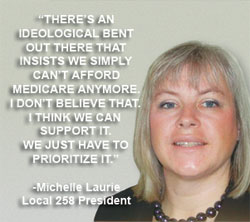(continued)
September 2004 IBEW Journal
Romanow Seeks
Federal Solutions
Annual Health Care Spending
(in U.S. dollars)
 |
These days, there’s much scrutinizing of 1984’s Canada Health Act, which guarantees a publicly paid health care system, but some argue the term "public delivery" could apply to private delivery if publicly paid. Still today, support by Canadians for a government-paid, single-payer system remains strong.
In a sweeping report released two years ago, the Royal Commission on the Future of Health Care in Canada made several recommendations, key among them increasing funding and reaffirming the importance of public health care by federal, provincial and territorial governments. Specifically, the Romanow report named for the commission’s chairman called for a greater emphasis on preventive health care, creation of a national health council, reforming primary care, expanding the Canada Health Act to include home health care, improving access to diagnostic services, covering a portion of prescription drug costs and addressing long waiting lists for some services.
On that advice, the Health Council of Canada has been recently created to bring together federal, provincial and territorial interests to start tackling problems on a national level. But Alberta and Quebec opted out of joining the council, arguing that the alliance intruded on their jurisdiction.
P3s to the Rescue?
 A movement that started with a few entrepreneurs seeking to fill a niche in health care coverage gaps has mushroomed into a wave of privatizing. Fueled by medical insurance and pharmaceutical companies on the hunt for bigger profits, the trend in Canada appears to be in favor of increasing privatization, or P3s, "public private partnerships." A movement that started with a few entrepreneurs seeking to fill a niche in health care coverage gaps has mushroomed into a wave of privatizing. Fueled by medical insurance and pharmaceutical companies on the hunt for bigger profits, the trend in Canada appears to be in favor of increasing privatization, or P3s, "public private partnerships."
Local 258 President Michelle Laurie, Vancouver, British Columbia, said there is an obvious need for change in the system, but Canadians are likely to be unpleasantly surprised by a premature embrace of privatization.
"There’s an ideological bent out there that insists we simply can’t afford medicare anymore," Laurie said. "I don’t believe that. I think we can support it. We just have to prioritize it."
St.-Germaine of Local 568 said strictly controlled privatization might bring Canadians better service while retaining a strong universal health system. He described nightly local newscasts that report which hospital emergency rooms are so full that patients are advised to go elsewhere in case of emergencies. St.-Germaine suggested a better alternative would be to open private clinics to alleviate 12-hour hospital waits some days to see a doctor.
"I don’t want to jeopardize our medicare system but you could give permits for a limited number of private clinics," he said. "It would give our members the opportunity to be treated faster. One way or another it’s going to happen anyway."
Laurie said private, for-profit health insurance and pharmaceutical companies see an opportunity in Canada and have their eye on a larger portion of the $110 billion spent on the industry each year. She suspects the constant drumbeat of reporting on the system’s failures really comes as a result of clever marketing from companies who see dollar signs in an increasingly privatized system.
Health care played a prominent role in the June federal elections, which resulted in the ruling Liberal party losing its outright majority in the parliament for the first time in years, forcing Prime Minister Paul Martin to forge a new coalition to stay in office. Martin promised during the campaign to commit millions to improving the system and scheduled a health care summit for this month.
In an agenda called "ambitious" by the Toronto Globe and Mail, Martin’s top priorities included reduced wait times for cardiac care, cancer treatment, diagnostic imaging, sight restoration and joint replacement. He also committed to establishing home care and prescription drug programs.
Labour Takes the Lead
Labour has been one of the strongest voices arguing for reinforcing and strengthening medicare. The labour-dominated New Democratic Party (NDP), which gained parliamentary seats in June, is using its increased power to push for social change.
Local 258’s Laurie said people have had the benefit of universal health care for so long that they do not properly appreciate it. Months-long waits for many services reinforce the notion that the system is in crisis and the insurance companies capitalize on that perception.
"We need to be more prudent in how we spend our dollars," said IBEW Local 1928 Business Manager Michael MacDonald in Halifax, Nova Scotia. "We don’t want to lose the good system we have. The NDP and others will keep the government to their promises or we’ll have a new election."
Medicare proponents who would like to see the system kept intact have a powerful argument in their favor against privatization: the United States. The patchwork of public and private health care providers in the United States contributes to the high administrative costs built into the American system. In Canada, less than 3 percent of the expenditures go to administrative costs; in the United States, administration is 15 percent of costs.
First District International Representative Peter Routliff said the "free market" in health care in the U.S. has more than 1,500 insurance providers with 10 different fee schedules, and a wide variety of co-payments, eligibility and deductibles. "From all the reports I have read, the U.S. health care model has created an expensive and complex health care administrative structure. Our national health care plan could not support these inefficiencies," Routliff said.
And the proliferation of managed care in the United States has severely limited choices of providers. In Canada’s publicly run system, patients go to the physician of their choice and the doctors never worry about their ability to pay for treatment.
Laurie said she can see Canada moving toward greater privatization just as the United States contemplates embracing a universal-care model like Canada.
"The problem is we’re being led into a mindset that privatization is the only solution and I don’t believe that," Laurie said. "I think there are some things people don’t need to profit off of and health care is one. We’re losing some of our social conscience and it scares me."

|


